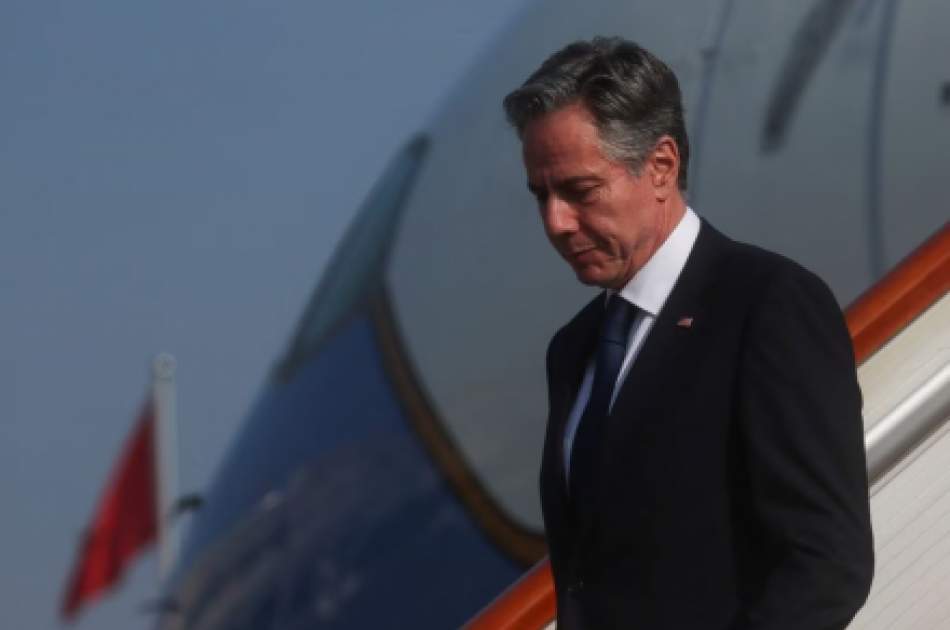Antony Blinken began meetings in Beijing, the first top American diplomat to visit China, amid frosty bilateral ties and dim prospects for any breakthrough on the long list of disputes.
Publish dateSunday 18 June 2023 - 14:21
Story Code : 271946
Afghan Voice Agency (AVA)_Monitoring, Having postponed a February trip after a suspected Chinese spy balloon flew over U.S. airspace, Blinken is the highest-ranking U.S. government official to visit China since President Joe Biden took office in January 2021.
Chinese Foreign Minister Qin Gang greeted Blinken and his group at the door to a villa in the grounds of Beijing's Diaoyutai State Guest House, rather than inside the building as is customary.
The two made small talk as they walked in, Qin asking Blinken in English about his long trip from Washington. They then shook hands in front of a Chinese and an American flag.
After heading into a meeting room, neither Blinken nor Qin made comments in front of reporters who were briefly allowed in.
Chinese assistant foreign minister Hua Chunying, who is attending the meeting, tweeted above a picture of the Qin and Biden shaking hands: "Hope this meeting can help steer China-U.S. relations back to what the two Presidents agreed upon in Bali".
Biden and Chinese President Xi Jinping held their long-awaited first face-to-face talks on the sidelines of a summit of the Group of 20 big economies in November on the Indonesian island of Bali, engaging in blunt talks over Taiwan and North Korea but also pledging more frequent communications.
During his stay through Monday, Blinken is also expected to meet with China's top diplomat Wang Yi and possibly Xi, seeking to establish open and durable communication channels to ensure the strategic rivalry between the two countries does not spiral into conflict.
There is an expectation Blinken's visit will pave the way for more bilateral meetings in coming months, including possible trips by Treasury Secretary Janet Yellen and Commerce Secretary Gina Raimondo. It could also set the stage for meetings between Xi and Biden at multilateral summits later in the year.
Biden said on Saturday he hopes to meet with President Xi in the next several months.
A November meeting of the two leaders on the Indonesian island of Bali briefly eased fears of a new Cold War, but following the flight of the alleged Chinese spy balloon over the United States, high-level communication has been rare.
The rest of the world will closely follow Blinken's trip as any escalation between superpowers could have worldwide repercussions on everything from financial markets to trade routes and practices and global supply chains.
"There's a recognition on both sides that we do need to have senior-level channels of communication," a senior State Department official told reporters during a refuelling stop in Tokyo en route to Beijing.
"That we are at an important point in the relationship where I think reducing the risk of miscalculation, or as our Chinese friends often say, stopping the downward spiral in the relationship, is something that's important," the official said.
Ties between the countries have deteriorated across the board, raising concerns that they might one day clash militarily over the self-ruled island of Taiwan, which China claims as its own. They are also at odds over issues ranging from trade, U.S. efforts to hold back China's semiconductor industry and Beijing's human rights track record.
Particularly alarming for China's neighbours has been its reluctance to engage in regular military-to-military talks with Washington, despite repeated U.S. attempts.
Speaking at a press conference on Friday before departing for Beijing, Blinken said his trip had three main objectives: Setting up mechanisms for crisis management, advancing U.S. and allies' interests and speaking directly about related concerns, and exploring areas of potential cooperation.
"If we want to make sure, as we do, that the competition that we have with China doesn't veer into conflict, the place you start is with communicating," Blinken said. He said he would also be raising the issue of U.S. citizens detained in China on charges Washington says are politically motivated.
Among topics likely to be discussed are potentially increasing commercial flights between the two countries, a U.S. official said, describing it as a move that would help promote people to people ties, although the official did not predict any progress.
Still, U.S. officials in a briefing call previewing the trip earlier in the week played down any expectations of much progress. While Blinken's main goal will be "candid, direct and constructive" discussions, the officials said, breakthroughs are not likely on any major issues, including the flow of fentanyl precursors and Americans detained in China.
Seeking China's cooperation on stemming the flow of fentanyl precursors was a key item on the agenda, the U.S. official said. The Chinese side has been reluctant to cooperate on the issue, U.S. officials have said.
avapress.net/vdci5zarqt1ay32.ilct.html
Tags
Top hits







